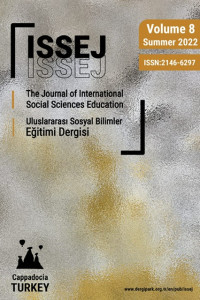Sosyal bilgiler öğretiminde öğretmen adaylarının dijital öykü kavramına yönelik görüşlerinin incelenmesi
Bilgi ve iletişim teknolojileri, insan ve insana dair her şeyi değiştirip dönüştürmektedir. Değişen ve gelişen teknoloji ile birlikte toplum ve toplumu oluşturan her kurum da kaçınılmaz olarak dönüşüme uğramıştır. Eğitim kurumunda bilgi ve iletişim teknolojilerinin yansımaları, öğrenme-öğretme ortamlarında değişimi başlatmıştır. Teknolojinin eğitime entegre edilmesi ve sınıf ortamında yenilikçi ve çağa uygun yöntem ve tekniklerin kullanılması noktasında, Eğitim Fakültelerine önemli bir görev düşmektedir. Çünkü geleceğin öğretmen adaylarının, teknoloji çağının gerektirdiği bilgi ve beceri donanımına sahip olmaları beklenmektedir ve bu bilgileri öğrencilere aktarmak için sınıf içerisinde uygulayabilecekleri etkili pedagojik modeller ve yöntemler hakkında bilgi sahibi olmaları gerekmektedir. Bu nedenle eğitim fakültesi öğrencilerinin ve geleceğin öğretmen adaylarının, son yıllarda adından çokça söz edilen ve birçok çalışmada üzerinde durulmaya başlanan dijital öykü kavramı hakkında bilgi sahibi olmalarının ve bu kavramı anlamalarının önemli olduğu düşünülmektedir.
Bu çalışmanın amacı, öğretmen adaylarının dijital öykü kavramına ait görüşlerini ortaya çıkarmaktır. Araştırma, 2021-2022 eğitim öğretim yılında Nevşehir Hacı Bektaş Veli Üniversitesi Eğitim Fakültesi Sosyal Bilgiler Eğitimi Ana Bilim Dalı’nda öğrenim gören 26 öğretmen adayı ile yürütülmüştür. Araştırmada betimsel tarama yöntemi kullanılmıştır ve veri toplama aracı olarak üç bölümden oluşan “Dijital Öykü Kavramına Yönelik Bilgi ve Algı Formu” oluşturulmuştur. Verilerin analizinde ise içerik analizi yöntemi kullanılmıştır. Dijital Öykü Kavramına Yönelik Bilgi ve Algı Formu dahilinde olan 8 soru ile ilgili sonuçlara göre, Sosyal Bilgiler öğretmen adaylarının, dijital öyküleme kavramı ve öğrenciye katkıları bakımından farkındalık düzeylerinin yüksek olduğu fakat dijital öyküleme uygulamaları bakımından farkındalıkları ve yeterlilik düzeylerinin düşük olduğu görülmüştür.
Anahtar Kelimeler:
dijital öyküleme yöntemi, teknoloji, öğretmen adayı, sosyal bilgiler
Examınatıonof teacher’s opınıons on the concept of dıgıtal story ın socıal study teachıng
Information and communication technologies change and transform everything about human and human. With the changing and developing technology, the society and every institution that constitutes the society has inevitably been transformed . The reflections of information and communication technologies on the educational institution started the change in learning-teaching environments . Education Faculties have an important role about being integrated technology into education and being used innovative and contemporary methods and techniques in the classroom environment. Because pre-service teachers of the future are expected to have the knowledge and skills required by the age of technology, and in order to convey this information to students, they need to have knowledge about effective pedagogical models that they can apply in the classroom and suitable methods for the technology age. For this reason, it is thought that it is important for the education faculty students to have knowledge and opinions about the concept of digital story, which has been mentioned a lot in recent years and has started to be emphasized in many studies.
The aim of this study is to reveal pre-service teachers’ views on the concept of digital story. The research was carried out with twenty-six pre-service teachers studying at Nevşehir Hacı Bektaş Veli University, Faculty of Education, Department of Social Studies Education in the 2021-2022 academic year. The descriptive survey method was used in the research and the "Knowledge and Perception Form for the Concept of Digital Story", which consists of three parts, was created as a data collection tool. Content analysis method was used in the analysis of the data. According to the results related to the eight questions within Knowledge and Perception Form for the Concept of Digital Story , It was seen that social studies pre-service teachers, in terms of digital story telling concepts and contributions to students have high awareness level, but they have low awareness and proficiency level in terms of digital story telling practices.
___
- Robin, B. R. (2008). Digital storytelling: A powerful technology tool for the 21st. Theory Into Practice, 220-228.
- Kajder, S. B. (2004). Enter Here: Personal Narrative and Digital Storytelling. The English Journal, 93(3), 64-68.
- Başlangıç: 2011
- Yayıncı: Abdulkadir UZUNÖZ
